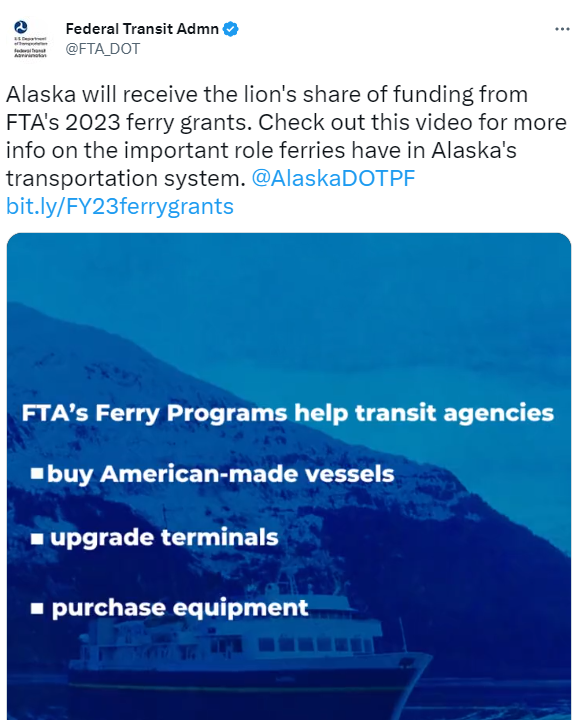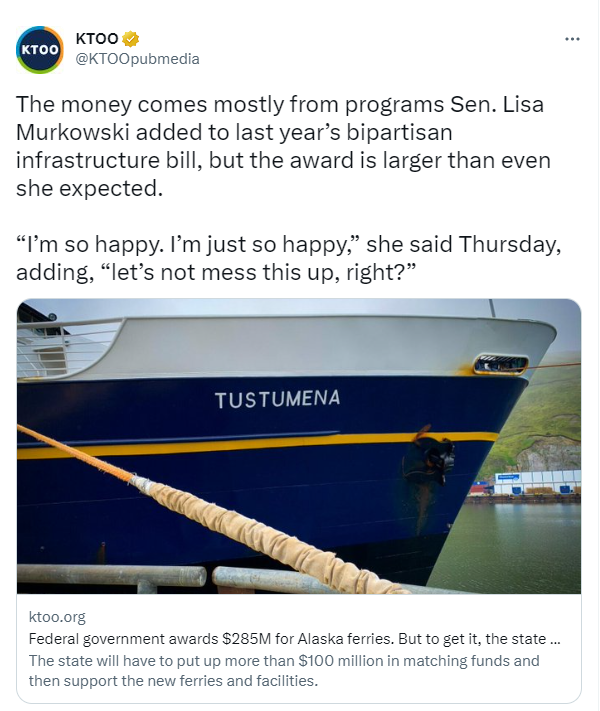ICYMI—A ‘Big Fat Deal in Alaska’
Last week, U.S. Senator Lisa Murkowski (R-Alaska) joined U.S. Transportation Secretary Pete Buttigieg and Federal Transit Administration Administrator Nuria Fernandez in announcing more than $285 million in federal funding from the Infrastructure Investment and Jobs Act (IIJA) for the Alaska Marine Highway System (AMHS) for operations, vessel acquisitions, shoreside infrastructure, and reduced environmental impact.
The funding for Alaska accounts for nearly 75 percent of the awards announced across the nation. This is the first round under the IIJA’s newly established Electric or Low Emitting Ferry Pilot Program and the Ferry Service for Rural Communities Program—which Senator Murkowski created and prioritized as a lead author of the bipartisan infrastructure law. Additional funding should be made available in each of the next three fiscal years.
Excerpts
Secretary Buttigieg:
- “I especially want to recognize and thank Senator Murkowski. Senator Murkowski was key to getting these provisions into the law. She is a champion of passenger ferry service, especially in rural communities, and is a big part of the reason why we have this bipartisan infrastructure law in the first place, that has allowed our administration to support bridges, roads, ferries, airports, ports, and more.”
- “A lot of people, when they think about transportation, will be more likely to think on trains and automobiles, but for so many communities, including the 35 communities along the Alaska Marine Highway, where everything is spaced further apart, where transportation is very expensive, waterways are critical, and they're part of everyday life. The six grants for Alaska that we’re discussing today are going to help replace old vessels, help to upgrade docks, and help to improve service. They’re going to better connect people to resources to opportunities into the vital services they count on.”
- “These projects are going to advance so many of our key goals when it comes to infrastructure policy, jobs, and economic growth because they’re connecting people in more spread out areas to the jobs and opportunities in city centers that they might not otherwise reach; accessibility and equity because waterways connect rural towns and Alaska Native communities with schools and doctors and other vital resources; and addressing climate because electric ferries mean cleaner air, less pollution, and lower emissions. So it really makes it a win-win-win....”
Senator Murkowski:
- “The bipartisan infrastructure bill is significant in so many ways. For a state like Alaska that is somewhat unique in our limited infrastructure as we don’t have roads that crisscross our entire state, we are a state that is very reliant on our airports and our waterways. And so, through the benefits of the infrastructure bill, we’ve seen strong support for our small airports—that’s going to make a difference—but what is so key within this infrastructure bill, what is really monumental, which is really, quite honestly, a big fat deal in Alaska, is to be able to connect our coastal communities over the water.”
- “We have, over the years, over the decades, relied on our Alaska Marine Highway System with currently 35 different ports along the Marine Highway System route. This spans an area of 3,500 miles…We are a state that comprises a landmass that is equal to 1/5 of the United States. And so how we connect is perhaps very different than in the lower 48. So I appreciate the administration and my colleagues recognizing that for Alaska, how we connect may look a little bit different and the value then to the Alaska Marine Highway System. So, you're right in in recognizing that I really did have Alaska's System in mind when we were working on the bipartisan infrastructure bill. I worked hard to create this Ferry Service for Rural Communities Program.”
- “It has been important for us to be able to communicate with our State Legislature, our State Administration, and the Governor to reinforce the opportunity that we have now to put the Alaska Marine Highway System on a sustainable footing going forward, and the benefits that it will provide for these communities, the economies that it would help, the families that it will help, the villages that will be able to be connected again. As well as ensuring that with modernization and update and moving towards opportunities for electric ferries as we're also working to reduce our emissions.”
- “This is great news. For our infrastructure, but also for our state’s economic future going forward.”
In the News
- Anchorage Daily News: Feds inject nearly $300M into Alaska Marine Highway System for improvements
- Marine Log: Alaska wins big in FTA ferry funding awards
- Alaska’s News Source: Alaska Marine Highway System awarded $285M from federal government
- Alaska Public Media: Federal government awards $285M for Alaska ferries. But to get it, the state needs to put up money, too
- Juneau Empire: Feds float AMHS $285M in ferry infrastructure funding
What They’re Saying on Social Media











